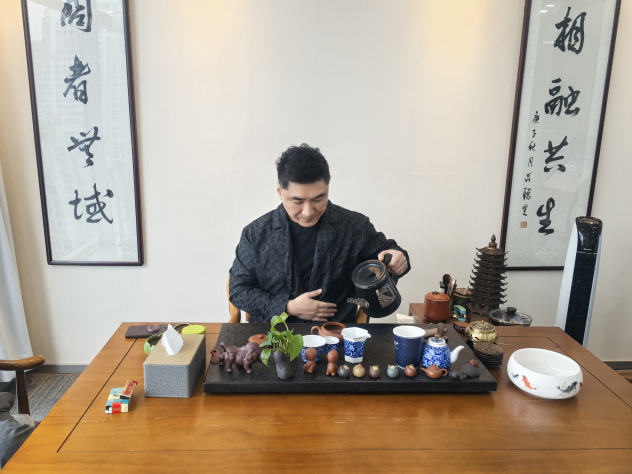2026-01-16
Life
2025-06-27
1182 Read.
At a “MA LU BIAN BIAN” hot pot restaurant on Zhongxin Road in Nanshan District, Shenzhen, a customer sits in a retro green vinyl booth, ordering a bowl of spicy brain and signature fried potatoes. The wall is adorned with hand-drawn graffiti and Sichuan-style slogans like “Not afraid of spicy, only afraid it's not spicy enough.” Since opening in 2019, this popular location has been featured on Dianping’s “Must Eat List” for three consecutive years and has become a model for the successful expansion of Chengdu hot pot brands into South China. Behind it stands CONG, LEI—a brand manager adept at distilling complex logic into replicable models.
Since October 2017, CONG, LEI has served as Chairman of Shenzhen Jiuyaojiu Catering Management Co., Ltd., fully responsible for the authorized operation, strategic planning, store expansion, and team building of the MA LU BIAN BIAN brand in Shenzhen. With systematic management capabilities, he led the brand’s expansion from Chengdu to the Pearl River Delta, building a Shenzhen-localized “urban version” of the brand in one of China’s most competitive markets—gaining widespread industry attention.

“‘MA LU BIAN BIAN’ originated in Chengdu and is characterized by its ‘street-style vitality,’ but the customer profile, pace, and consumption habits in Shenzhen are completely different from Sichuan and Chongqing,” recalled CONG, LEI. “What we needed was not to simply replicate, but to rebuild a model suited to the South China market.”
Under his leadership, Jiuyaojiu localized the store model: removing heavily oily and spicy dishes, strengthening small-portion combinations, and enriching the drink product lineup. Front-end flow and back kitchen output ratios were adjusted based on research to improve per-square-meter and per-employee efficiency. A customer feedback loop mechanism was introduced to consolidate feedback from Dianping, official WeChat accounts, and mini-program platforms to regularly optimize the menu.
In terms of management systems, CONG, LEI promoted the establishment of a dual-track “self-operated + franchised” store management system and led the drafting of the Shenzhen Operation Standards Manual, covering four key areas: operations, service procedures, ingredient testing, and employee training. Under his guidance, the company achieved both operational and profitability goals for self-operated stores in Shiyan and Xili, while also developing a mature organizational model and support system for future franchise expansion.
“The success of a restaurant chain doesn’t lie in how many stores are opened, but whether each one is stable and controllable,” said CONG, LEI. “Behind this lies a systematic management structure, not just a single best-selling dish.”
During this period, the company continuously earned dual recognition from the market and consumers. From 2019 to 2021, MA LU BIAN BIAN's Shenzhen stores were selected for the Dianping “Chengdu Must Eat List” city linkage column three years in a row and ranked first on the “Top 10 Specialty Hot Pot Brands of the Year” list in 2021. Both media and consumers agreed that the brand successfully fused “Sichuan flavor DNA” with “Shenzhen efficiency.”
CONG, LEI also places great emphasis on the role of a business within the urban cultural ecosystem. He has repeatedly led teams to participate in food festivals, community co-construction, and food+public benefit projects organized by institutions such as the Chengdu Food Culture Exchange and Innovation Center and the Shenzhen Catering Association, stressing that “Urban chain brands must do more than provide service; they should be part of the city’s food culture.”
The reporter noted that at one such community hot pot charity event, he opened idle time slots at the restaurant for free tasting by local families, promoted a “parent-child dining time-sharing system,” and collaborated with the municipal cultural center to curate a hot pot culture exhibition—transforming the “dining space” into a “cultural display platform.” This not only enhanced the brand’s community identity, but was also cited by several city catering associations as a model case for public engagement by food brands.
Beyond internal company management, CONG, LEI has also contributed to shaping industry standards. He led the drafting of the Pilot Guide to Store Service Standards, which has now been piloted across dozens of regional chain brands in Shenzhen. As a business representative, he has participated in multiple Greater Bay Area catering cooperation forums, where he proposed a “high-frequency scenario standard-sharing mechanism” to promote alignment across operational standards between brands.
“I’ve always believed that a restaurateur isn’t just opening stores—they’re defining a kind of culture,” CONG, LEI said at the end of the interview.
From optimizing store output per square meter to engaging in brand culture, from team pipeline building to the standardization of regional operations, CONG, LEI has provided a solid organizational and management foundation for the development of MA LU BIAN BIAN in Shenzhen. His career also reflects the effort and achievements of modern Chinese restaurant brands in pursuing systematic growth across regions and cultures.